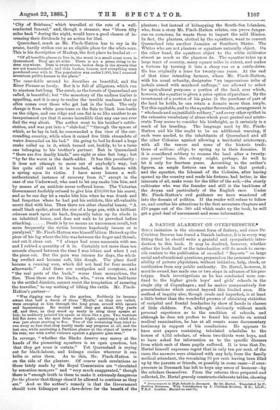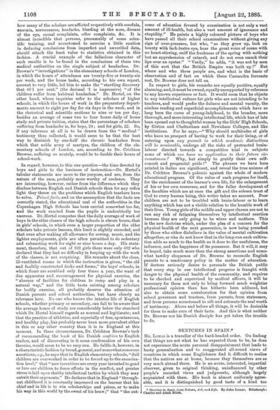A DANISH ALARMIST ON OVERPRESSURE.*
SINCE imitation is the sincerest form of flattery, and since Dr. Crichton Browne has found a Danish imitator, it is in every way fitting that he should write a grateful and sympathetic intro- duction to this book. It may be doubted, however, whether either the book itself or the introduction will do much to recon- cile readers to the publication of so-called " Reports " on large social and educational questions, prepared on the personal respon- sibility of private physicians, without initiative, help, check, or verification from any public authority. Dr. Hertel, however, it must be owned, has made one or two steps in advance of his pro- totype. Such investigations as be has conducted were con- fined to the higher grade boys' and girls' schools in the single city of Copenhagen ; and he makes comparatively few generalisations which extend beyond this limited area.. His method of inquiry also, though crude and imperfect, is at least a little better than the wonderful process of obtaining statistics of occipital and frontal headaches by show of hands in classes of little children. For, although obviously without much personal experience as to the condition of schools, and although he does not profess to found his results on actual medical examination, he has at all events some documentary testimony in support of his conclusions. He appears to have sent papers containing tabulated schedules to the homes of 4,352 scholars, of whom two-thirds were boys, and to have asked for information as to the specific diseases from which each of these pupils suffered. It is true that Dr. Hertel himself expresses regret that in only ten per cent, of the cases the answers were obtained with any help from the family medical attendant, the remaining 90 per cent. having been filled up by the parents or friends, or possibly in some cases—if over- pressure in Denmark has left to boys any sense of humour—by the scholars themselves. From the returns thus prepared and collected, Dr. Hertel gravely constructs elaborate tables, showing
• Overpressure in High Schools in Denmark. By Dr. Hertel. Translated by C. Godfrey Sorenson. With Introduction by J. Crichton Browne, M.D., LL.D., F.H.B. London: Macmil.an and Co.
how many of the scholars are afflicted respectively with scrofula, anaemia, nervousness, headache, bleeding at the nose, disease of the eye, casual complaints, other complaints, Om. It is almost incredible that persons, presumably of some scien- tific training, and accustomed to exercise a little caution in deducing conclusions from imperfect and unverified data, should attach the least value to statistics obtained in this fashion. A crucial example of the fallacious character of such results is to be found in the conclusions of these two medical authorities on the single subject of headaches. Dr. Browne's "investigations" in the elementary schools of London, in which the hours ot attendance are twenty-five or twenty-six per week, and the home tasks, according to his own report, amount to very little, led him to make the " startling discovery that 46.1 per cent." (the decimal '1 is impressive) " of the children suffer from habitual headaches." Dr. Hertel, on the other hand, whose inquiries refer to the scholars of higher schools, in which the hours of work in the preparatory depart- ments amount to eight per day for six days in the week, and in the rhetorical and scientific sections to nine or ten per day, besides an average of some two to four hours daily of home study and private tuition, states that the percentage of scholars suffering from headache is, for boys, 24; and for girls, 22. So, if any inference at all is to be drawn from the " medical " testimony thus collected, it would seem to be that the best way to diminish by one-half the chronic headaches from which that noble army of martyrs, the children of the ele- mentary schools of London, are, according to Dr. Crichton Browne, suffering so acutely, would be to double their hours of school-work.
In regard, however, to this one question—the time devoted by boys and girls to the business of instruction—Dr. Hertel's tabular statements are more to the purpose, and are, from the nature of the case, probably more worthy of credence. They are interesting, however, rather from the difference which they disclose between English and Danish schools than for any reflex light they throw on the problems which English teachers have to solve. Primd facie, and on the assumption that the facts are correctly stated, the educational zeal of the authorities in the Copenhagen High Schools has been carried somewhat too far, and the work exacted from the pupils is undoubtedly too onerous. Dr. Hertel computes that the daily average of work of boys in the elder classes of the high schools is eleven hours, that in girls' schools, in which even a larger proportion of the elder scholars take private lessons, this limit is slightly exceeded, and that even after making all allowance for sewing, music, and the lighter employments, girls are often permitted to do sedentary and exhausting work for eight or nine hours a day. His state- ment, therefore, that out of 821 girls there were only 692 who declared that they had no difficulty in keeping up with the work of the classes, is not surprising. His remarks about the close, ill-ventilated rooms in which the instruction is given, " the old and faultily constructed desks and forms," the boys' schools, in which floors are scrubbed only four times a year, the want of due apparatus and encouragement for physical exercise, the "absence of facilities for children to romp and play in a natural way," and the little taste existing among scholars for bodily exercise, all probably deserve the attention of Danish parents and school authorities, but have clearly no relevance here. No one who knows the interior life of English schools, whether primary or secondary, can fail to be aware that the average hours of study are considerably below the standard which Dr. Hertel himself regards as normal and legitimate; and that the practice of athletics, and especially of free, spontaneous, and healthy play, has probably never been more prevalent either in this or any other country than it is in England at this moment. In these circumstances, Dr. Crichton Browne's task of recommending the book of his Danish confrere to English readers, and of discovering in it some confirmation of his own theories, would seem to be no easy one. He fulfils it, however, in a characteristic fashion by broad, general, and somewhat sonorous assertions; e.g., he says that in English elementary schools, "dull children are overworked in order to be forced up to the examina- tion level;" that " new incentives are every year invented to goad or lure our children to fierce efforts in the conflict, and greater stress is laid upon shabby intellectual tactics by which they may outwit their opponents." He declares that in England "through- out childhood it is constantly impressed on the learner that his chief end in life is to win scholarships and prizes, or to make his way in this world by the sweat of his brow ;" that "the out-
come of education fevered by examination is not only a vast amount of ill-health, but also a vast amount of ignorance and stupidity." He paints a highly coloured picture of boys who have passed all their school examinations without giving any sign of over-pressure, but who, " as they grow up, look on beauty with lack-lustre eye, hear the great voice of ocean with no heart-stirring, sniff the freshness of the spring with nothing but an apprehension of catarrh, and do not even smack their lips over an oyster." "Verily," he adds, "it was not by men of this sort that the British Empire was built up !" But where and who these people are, and what is the basis of observation and of fact on which these Cassandra forecasts rest, Dr. Browne does not tell us.
In respect to girls, his remarks are equally positive, equally alarming, and, it must be owned, equally unsupported by reference to any known experience or fact. It would`seem that he objects to any intellectual culture for girls who are not intending to be teachers, and would prefer the dulness and mental vacuity, the aimless reading and superficial accomplishments which have so long been the curse of young-ladyhood, to the broader, more thorough, and more interesting intellectual life, which has of late been opened out to thoughtful women by the Girls' High Schools, by Girton and Cheltenham and Newnham Colleges, and like institutions. For he says,—" Why should multitudes of girls who have no prospect of having to work for their living, or of entering upon any pursuit in which academic distinctions will be serviceable, undergo all the risks of protracted brain- labour directed towards a competitive trial in subjects some of which can have no application to their future cir- cumstances ? Why, but simply to gratify their own self- conceit and progenital pride !" The phrases we have here printed in italics are significant, and reveal the true animus of Dr. Crichton Browne's polemic against the whole of modern educational progress. Of the value of such progress for itself; for the enrichment of the learner's own life, for the enlargement of his or her own resources, and for the fuller development of the faculties which are at once the gift and the solemn trust of God to every human being, this writer takes no account. Poor children are not to be troubled with brain-labour or to learn anything which has not a visible relation to the humble work of their lives. Young girls of the middle and upper classes are not to run any risk of fatiguing themselves by intellectual exertion because they are only going to be wives and mothers. This is the new doctrine which, under the plea of a concern for the physical health of the next generation, is now being preached by those who either disbelieve in the value of mental cultivation altogether, or who do not know that in the long-run such cultiva- tion adds as much to the health as it does to the usefulness, the influence, and the happiness of its possessor. But it will, it may be hoped, take much more than the strong assertions and some- what tawdry eloquence of Dr. Browne to reconcile English parents to a reactionary policy in the matter of education. If doctors seriously desire to persuade the British public that every step in our intellectual progress is fraught with danger to the physical health of the community, and requires to be checked and supervised by medical officers, it will be necessary for them not only to bring forward much weightier professional opinion than has hitherto been adduced, but also to obtain some corroboration for that opinion from school governors and trustees, from parents, from statesmen, and from persons accustomed to sift and estimate the real worth of testimony. Above and before all things, it will be desirable for them to make sure of their facts. And this is what neither Dr. Browne nor his Danish disciple has yet taken the trouble to do.



































 Previous page
Previous page